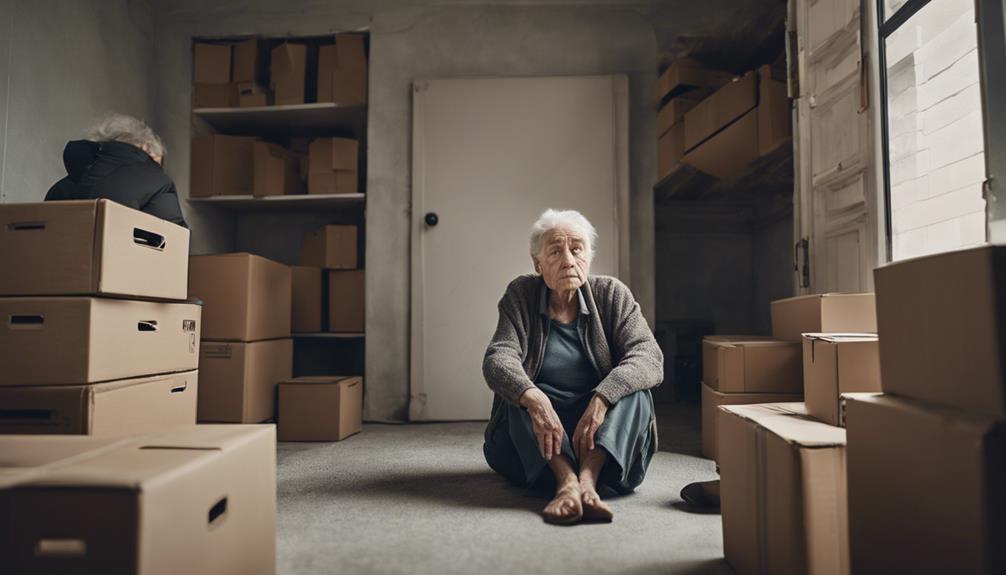When faced with grief, we experience seven stages. Initially, shock and disbelief take hold – feeling numb and questioning reality. Following that is denial, acting as a shield from the pain. Anger comes next, a natural emotion to express. Bargaining emerges, attempting to negotiate our emotions. Subsequently, depression arrives, leading to profound sadness. Ultimately, acceptance signals a fresh start. This phase of healing assists us in moving forward and treasuring memories. These stages direct us through loss, demonstrating a route to emotional recovery and development. Understanding these phases can assist in navigating difficult times and discovering resilience when confronted with challenges.
Key Takeaways
- Shock and disbelief stage involves numbness and questioning reality.
- Denial is a coping mechanism for emotional protection.
- Anger is a common response fueled by frustration or blame.
- Bargaining includes seeking compromises and reflecting on positive memories.
- Depression stage features overwhelming sadness and isolation.
Shock and Disbelief
Experiencing shock and disbelief is a natural response to loss, serving as a shield against the overwhelming emotions of grief. When we first encounter a significant loss, our minds may struggle to accept the reality of what's happened. This initial reaction can lead to feelings of numbness and being disconnected from the world around us. We might find ourselves questioning the truth of the situation, unable to fully grasp the magnitude of our loss.
During this phase, denial often becomes a coping strategy. It can manifest as difficulty accepting the truth, as we try to shield ourselves from the pain and sorrow that accompany the loss. Denial may lead to emotional detachment, creating a sense of unreality as we grapple with the enormity of our emotions. It's essential to recognize these initial reactions as part of the grieving process, allowing ourselves the time and space to navigate through the shock and disbelief before moving forward.
Denial

In the initial stages of grief, denial acts as a protective shield against the harsh reality of loss, allowing individuals to temporarily avoid confronting overwhelming emotions. Denial is a common coping mechanism in the grief process, where individuals may resist accepting the reality of the loss. It serves as a defense mechanism to protect from overwhelming emotions, leading to feelings of numbness and disbelief.
People in denial may avoid reminders of the loss and question the truth of the situation to create a buffer against pain. This stage of denial can manifest as difficulty acknowledging the loss, feeling disconnected, or denying the impact of the grief. Emotional detachment may occur as individuals struggle to come to terms with the loss.
Understanding that denial is a natural part of the grieving process can help individuals navigate through this challenging stage with patience and self-compassion.
Anger
Moving on from denial, anger emerges as a common emotional response during grief, often fueled by feelings of frustration, injustice, or blame. It's natural to experience anger as part of the grieving process, and it may manifest in various ways, such as directing it inward towards oneself or outward towards others, including the deceased.
Expressing anger in healthy ways, like through open communication or engaging in physical activities, can help in processing grief effectively. Throughout the mourning journey, anger may fluctuate in intensity, but it's important to understand that it's a normal part of moving through loss.
Bargaining

During the bargaining stage of grief, we find ourselves trying to negotiate with our emotions, seeking compromises, and looking for alternative solutions to what's happened.
It's a time when we may feel guilt and helplessness, wondering if there was something more we could have done to prevent our loss. Reflecting on positive memories or conversing with the person we've lost can help us navigate through this challenging phase of grief.
Coping Through Negotiation
Seeking reasons, making promises, and attempting to negotiate with the reality of the loss characterize the stage of grief known as bargaining. During this phase, feelings of guilt and helplessness may arise as individuals try to find ways to cope with their pain.
It's common to reflect on cherished memories and seek solace in honoring the memory of the departed loved one. Writing letters or talking to the deceased can act as coping strategies in this stage.
Searching for Compromise
In the bargaining stage of grief, individuals often find themselves searching for compromises or making deals to alter the outcome of their loss. It's common to dwell on 'if only' or 'what if' scenarios, trying to find ways to change what's happened. Some may even attempt to negotiate with a higher power, fate, or the person they've lost. Feelings of guilt and regrets can weigh heavily during this phase.
Bargaining is a response to feeling helpless, as people try to regain control over the situation. It's important to recognize these emotions and thoughts as part of the grieving process, allowing oneself to navigate through this stage with patience and self-compassion.
Seeking Alternate Solutions
Exploring different avenues for resolution, individuals in the bargaining stage of grief often attempt to renegotiate the terms of their loss. This stage involves seeking alternate solutions, feeling guilt and helplessness while trying to make sense of the loss. People may reflect on what could have been done differently or make promises in exchange for reversing the loss.
Bargaining can serve as a way to regain control or find meaning in an overwhelming loss. By examining bargaining behaviors, we gain insight into the emotional complexities of grief and the struggle to accept the reality of a loss. It's important to acknowledge these feelings and understand that bargaining is a common part of the grieving process as we navigate through our emotions towards acceptance.
Depression

Experiencing overwhelming sadness and hopelessness is a vital manifestation of depression during the grieving process. Symptoms of grief-related depression can include a loss of interest in daily activities. Isolating oneself from others is also common during periods of grief-related depression.
Physical symptoms like fatigue or insomnia may accompany feelings of intense longing for what's gone. Seeking help from a grief counselor is important for managing depression and finding healthy coping strategies.
It's essential to recognize these signs and symptoms to address them effectively. If you or someone you know is struggling with grief-related depression, don't hesitate to reach out for support. Remember, it's okay to ask for help, and there are professionals available to guide you through this challenging time.
Stay connected with loved ones, engage in self-care activities, and consider seeking professional assistance to navigate through the complexities of grief-related depression.
Testing

During the testing stage of grief, we start experimenting with new ways to cope with our loss.
This phase involves trying out different strategies to see what works best for us.
It's important to explore various coping mechanisms and seek support systems during this time.
Coping Mechanisms
Experimenting with various coping strategies is essential in effectively traversing the stages of grief. When dealing with grief, it's critical to express your emotions, set achievable goals, and maintain a healthy lifestyle. Trying out different coping mechanisms can help you find what works best for you.
Seeking professional help is a valuable resource in maneuvering the challenges of grief. Writing letters to your lost loved one or talking to them can aid in coping with feelings of guilt and bargaining. Engaging with others, seeking distractions, and finding healthy outlets for anger are also important coping strategies during the grieving process.
Support Systems
Utilizing diverse support systems is pivotal in maneuvering the complexities of grief and testing their effectiveness in providing comfort and guidance. Here are some key points on support systems:
- Support systems offer emotional and mental support during the stages of grief.
- Having a strong support system helps individuals navigate emotions effectively.
- Support can come from friends, family, support groups, therapists, or spiritual leaders.
- These systems provide a safe space for expression, understanding, and healing.
- Seeking support from various sources can aid in coping with grief, offering different perspectives and coping strategies.
Acceptance

Traversing through the 7 stages of grief, acceptance emerges as a pivotal phase where individuals confront the reality of loss and begin to embrace a new chapter in life. It involves acknowledging that the loss is real and accepting that it can't be changed. Moving forward while still honoring the memories of the deceased loved one is a significant aspect of this stage.
Engaging with others and seeking distractions can help in coping with the pain and adjusting to a new normal. Acceptance allows individuals to reconnect with life and consider future possibilities. It's a vital step in the healing process, as it enables one to start looking towards the future while still holding onto the cherished memories of the past.
Frequently Asked Questions
What Is the 7 Stage Grieving Process?
The 7 stage grieving process involves a series of emotional stages like shock, denial, and acceptance. These stages help us navigate through grief, understand our feelings, and eventually heal. Each stage is crucial in our journey to healing.
What Is the Hardest Stage of Grief?
Acceptance, the hardest stage of grief for some, demands embracing the loss's finality and adjusting to a new normal. It's like maneuvering through a storm, but with time, we learn to find peace.
How Do I Know What Stage of Grief I'm In?
We can identify our grief stage through our predominant emotions and behaviors. It's normal to wonder where we are in the process. Recognizing our feelings and seeking support can help us navigate this challenging time.
What Not to Do When Grieving?
When grieving, we must avoid suppressing emotions, isolating ourselves, rushing the process, or self-medicating. Seeking support, being patient with ourselves, and asking for help when needed are vital. It's essential to navigate grief with care and compassion.
Conclusion
To summarize, comprehending the 7 stages of grief can assist us in navigating through challenging times in life. Just like a caterpillar transforming into a butterfly, we too can progress through these stages and emerge stronger on the other side. By understanding these emotional phases, we can offer ourselves patience and grace as we process our feelings. In challenging moments, especially toward the end of life, knowledge of the *four essential endoflife drugs* can provide comfort and relief, both for the individual and their loved ones. With the right support and care, healing is always possible—even in the most difficult of circumstances.
By acknowledging and embracing our emotions, we can ultimately find peace and healing. Remember, it's okay to feel a range of emotions during times of loss and change. Embrace the journey and trust in the process of healing.









